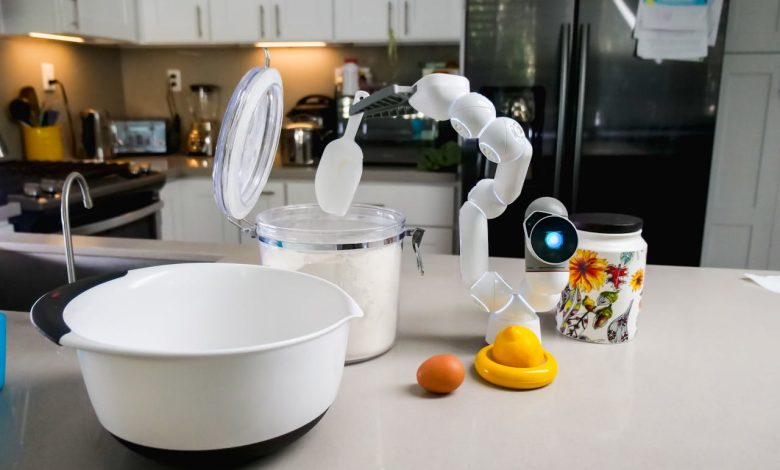How AI Home Appliances Will Change Your Home Experience in 2025

Artificial Intelligence is no longer a futuristic concept, it’s a reality transforming our everyday lives, especially in the home. In this in-depth guide, we explore how AI is integrated into home appliances, reshaping how we cook, clean, and secure our homes.
From smart ovens that suggest cooking programs to washing machines that learn your wash cycles, this article examines real-world case studies, product examples, and future predictions that illustrate the impact of AI on convenience and energy efficiency. If you’re looking to understand the role of AI home appliances, this guide will serve as your comprehensive resource.
The Evolution of AI in Home Appliances
From Automation to Intelligent Adaptation
Historically, home appliances were designed to perform fixed functions. Today, AI has transformed these devices into adaptive systems that learn from your behavior and optimize their performance over time.
- Learning Capabilities: Modern appliances can adjust their operations based on user habits. For example, an AI-powered refrigerator can monitor your grocery consumption and even suggest shopping lists.
- Predictive Maintenance: By analyzing usage patterns, these devices can predict when they need servicing, reducing downtime and extending their lifespan.
- Energy Efficiency: AI allows appliances to operate in the most energy-efficient manner by optimizing cycles and reducing waste, making them essential elements of the modern home.
These innovations have positioned AI home appliances as the cornerstone of the new smart home era.
Categories of AI-Driven Home Appliances
1. AI Kitchen Gadgets 2025

.The kitchen is perhaps the most exciting arena for AI innovations. AI kitchen gadgets 2025 are setting new standards for culinary technology:
Smart Ovens and Cooking Assistants
- Functionality: These ovens not only preheat but also analyze cooking patterns, suggesting ideal temperature and timing settings for various recipes.
- Case Study: One innovative oven uses machine learning to adjust its performance based on the type of food being cooked, leading to consistent results and improved energy efficiency.
- User Benefits: Enjoy perfectly cooked meals with minimal intervention and reduced guesswork.
AI-Enabled Refrigerators
- Functionality: These refrigerators monitor inventory, predict spoilage, and suggest recipes based on available ingredients.
- Real-World Example: Some models now come with touch screens that integrate with your smartphone, allowing remote access to your food inventory and even online grocery ordering.
- Impact: Reduce food waste while ensuring you have fresh ingredients at hand.
2. Smart Appliances with AI
Beyond the kitchen, AI integration spans a wide range of home devices:
Intelligent Washing Machines
- Adaptive Wash Cycles: These machines learn from your laundry habits, adjusting water levels, detergent usage, and cycle duration to achieve optimal cleaning with minimal energy waste.
- Efficiency Gains: By tailoring wash cycles to the fabric type and load size, they extend the lifespan of clothes and save on utility bills.
Advanced Dishwashers
- Optimized Cleaning: AI dishwashers assess the dirt level on dishes and adjust the water pressure and temperature accordingly.
- Convenience Factor: They can automatically schedule cleaning cycles during off-peak hours, ensuring energy is used when costs are lowest.
Intelligent Home Security Systems
- Enhanced Surveillance: AI-powered cameras and sensors use facial recognition and pattern analysis to differentiate between everyday activity and potential security threats.
- Integration: These systems communicate with other intelligent home devices, providing a cohesive network that boosts overall home safety.
In-Depth Analysis: How AI Improves Efficiency and Convenience
Personalization and Customization
One of the biggest advantages of smart appliances with AI is their ability to offer personalized experiences. Imagine an AI-powered oven that learns your cooking style and pre-sets your favorite recipes or a washing machine that adjusts cycles based on the type of fabric. This level of customization not only enhances convenience but also maximizes energy efficiency by tailoring operations to actual needs rather than generic defaults.
Real-Time Data and Feedback
Intelligent home devices continuously gather data to optimize performance. Whether it’s adjusting the temperature of a smart thermostat or optimizing a dishwasher’s cycle, real-time data helps reduce energy consumption and operational costs. This dynamic adjustment is a game-changer in managing household resources effectively.
Sustainability and Environmental Impact
AI’s integration into home appliances contributes significantly to sustainability efforts. By optimizing energy use and reducing waste, AI home appliances help lower your carbon footprint. These devices not only perform tasks more efficiently but also promote eco-friendly practices by adapting to environmental conditions and user behavior.
For more information on energy-efficient practices and sustainable tech, visit Energy.gov for expert insights on reducing energy consumption in your home.
Future Predictions and Emerging Trends
The future of AI home appliances is full of potential, with several trends already emerging:
- Seamless Integration: Future devices will work together more cohesively, forming a unified system that responds to every facet of your daily life.
- Increased AI Capabilities: Expect more appliances to incorporate advanced AI algorithms that can predict user behavior and optimize performance to a new level.
- Focus on Sustainability: As energy costs rise and environmental concerns grow, manufacturers will prioritize energy efficiency and eco-friendly designs.
- User-Centric Interfaces: Enhanced voice and gesture control will make operating these devices even more intuitive, ensuring that technology is accessible to everyone.
These trends underscore the transformative impact of AI on home appliances and the broader smart home ecosystem.
Practical Advice for Adopting AI Home Appliances
Integrating AI into your home may seem daunting, but a strategic approach can simplify the process. Here are some practical tips to get you started:
- Begin with Core Devices: Start with key devices like a smart thermostat or an AI-enabled refrigerator to experience immediate benefits.
- Ensure Compatibility: Verify that new devices integrate seamlessly with your current smart home ecosystem.
- Educate Yourself: Stay updated with the latest AI kitchen gadgets 2025 and intelligent home devices by following tech blogs, reviews, and expert forums.
- Plan Gradually: Implement changes incrementally to ensure you can adjust to new technologies without overwhelming your system.
- Focus on Sustainability: Prioritize devices that offer energy-saving benefits and contribute to a lower carbon footprint.
For additional insights on smart tech integration, don’t miss our internal article 10 Things I Wish I’d Known Earlier About Smart Tech and Gadgets.
Challenges and Considerations
While the benefits of AI home appliances are vast, there are challenges to consider:
- Privacy and Data Security: As devices collect more personal data, ensuring robust security measures is critical.
- Initial Costs: Advanced technologies may come with a higher upfront investment, though long-term savings often justify the expense.
- Technical Support: Integration and maintenance of AI systems require a certain level of tech-savviness, which can be a barrier for some users.
- Interoperability: Not all devices are created equal, so it’s important to choose products that work well together within your existing network.
Understanding these challenges will help you make more informed decisions and set realistic expectations for your smart home journey.
Conclusion
AI is fundamentally transforming the landscape of home appliances, bringing unparalleled convenience, efficiency, and personalization to our daily lives. This smart appliance with AI revolution is paving the way for a future where your home adapts to your lifestyle, reduces energy waste, and enhances overall comfort. As you explore the world of AI home appliances, remember to consider the incredible benefits and the potential challenges.
Embrace the innovations, stay informed about emerging trends, and invest wisely in technologies that will shape the future of home living. The transformation is underway—make your home a part of the AI revolution.
Frequently Asked Questions
Q: What exactly are AI home appliances?
A: AI home appliances are devices equipped with artificial intelligence that learn from your behavior, adapt their functions accordingly, and optimize performance to enhance energy efficiency and convenience.
Q: How do smart appliances with AI benefit everyday life?
A: They provide personalized experiences, reduce energy consumption, and offer real-time feedback to improve the functionality and efficiency of household tasks.
Q: What innovations can we expect in AI kitchen gadgets 2025?
A: Innovations include smart ovens that automatically adjust settings, AI-enabled refrigerators that manage food inventory, and other devices that offer dynamic recipe suggestions and improved energy efficiency.
Q: Are there any challenges to integrating AI in home appliances?
A: Yes, potential challenges include data privacy concerns, higher initial costs, and ensuring compatibility among different devices within a smart home ecosystem.


